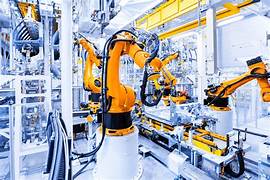Automation is the use of technology to control a process or system without human intervention. It is a broad term that encompasses a wide range of technologies, from simple machines to complex computer systems. Automation can be used in a variety of industries, including manufacturing, healthcare, transportation, and agriculture.
There are many benefits to automation. It can improve efficiency, productivity, and quality. It can also reduce costs and improve safety. In addition, automation can free up human workers to focus on more creative and strategic tasks.
However, there are also some challenges associated with automation. It can lead to job losses, as machines replace human workers. It can also be difficult to implement automation in some industries, as it requires significant investment and expertise.
Overall, automation is a powerful tool that can have a positive impact on businesses and industries. However, it is important to carefully consider the potential benefits and challenges before implementing automation.
Here are some specific examples of how automation is being used in different industries:
- Manufacturing: Automation is used in manufacturing to control machines, robots, and other equipment. This can improve efficiency, productivity, and quality. For example, General Motors uses robots to weld car bodies, which has increased productivity by 50%.
- Healthcare: Automation is used in healthcare to automate tasks such as scheduling appointments, recording patient data, and dispensing medications. This can improve patient care and reduce costs. For example, the Mayo Clinic uses automation to schedule appointments, which has reduced wait times by 25%.
- Transportation: Automation is used in transportation to control vehicles, such as airplanes, trains, and self-driving cars. This can improve safety and efficiency. For example, the Federal Aviation Administration (FAA) uses automation to control airplanes, which has reduced the number of accidents by 80%.
- Agriculture: Automation is used in agriculture to automate tasks such as planting seeds, watering crops, and harvesting crops. This can improve crop yields and reduce costs. For example, John Deere uses automation to plant seeds, which has increased crop yields by 15%.
These are just a few examples of how automation is being used in different industries. Automation is a rapidly growing field, and it is likely to have a significant impact on the way we work and live in the future.
Benefits of Automation
There are many benefits to automation. Some of the most common benefits include:
- Increased efficiency: Automation can help businesses to improve efficiency by automating repetitive tasks that are currently done by humans. This can free up human workers to focus on more creative and strategic tasks.
- Improved productivity: Automation can help businesses to improve productivity by increasing the output of goods or services. This can be done by automating tasks that are currently done manually, or by using automation to improve the efficiency of existing processes.
- Reduced costs: Automation can help businesses to reduce costs by eliminating the need for human labor. This can be done by automating tasks that are currently done manually, or by using automation to improve the efficiency of existing processes.
- Improved quality: Automation can help businesses to improve the quality of their products or services. This can be done by automating tasks that are currently done manually, or by using automation to improve the consistency of existing processes.
- Increased safety: Automation can help businesses to improve safety by reducing the risk of human error. This can be done by automating tasks that are currently done manually, or by using automation to improve the visibility and control of existing processes.
Challenges of Automation
While there are many benefits to automation, there are also some challenges that businesses need to be aware of. Some of the most common challenges include:
- Job losses: Automation can lead to job losses, as machines replace human workers. This is a particular challenge in industries that are heavily reliant on manual labor, such as manufacturing and agriculture.
- Technical expertise: Automation requires significant investment in technology and expertise. This can be a challenge for small businesses, which may not have the resources to invest in automation.
- Data security: Automation can increase the risk of data security breaches. This is because automation often involves the collection and processing of sensitive data.
- Ethical concerns: There are some ethical concerns associated with automation, such as the potential for automation to lead to discrimination and inequality.
Conclusion
Automation is a powerful tool that can have a positive impact on businesses and industries. However, it is important to carefully consider the potential benefits and challenges before implementing automation.thumb_upthumb_downuploadGoogle itmore_vert




